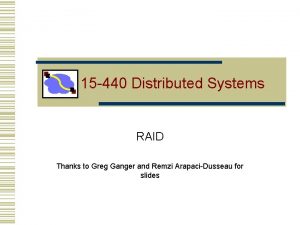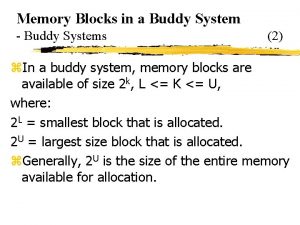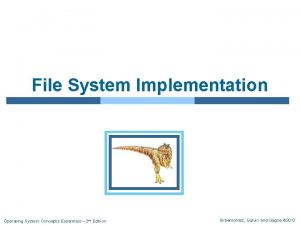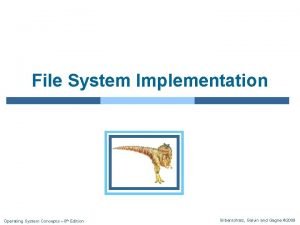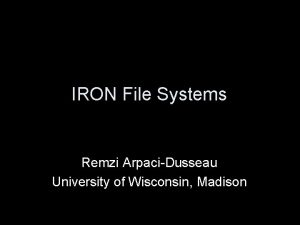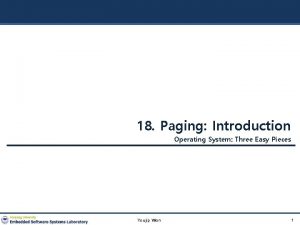Operating System Three easy pieces Remzi H ArpaciDusseau
















- Slides: 16

Operating System : Three easy pieces Remzi H. Arpaci-Dusseau Andrea C. Arpaci-Dusseau Chapter. 17 Free-Space Management Minkyu Kang(mkkang@dcslab. snu. ac. kr) School of Computer Science and Engineering Seoul National University

Outline § We see how to manage free memory through allocating mechanisms § Splitting § Coalescing § When memory is allocated, fragmentation problems can occur § Internal Fragmentation § External Fragmentation § We several free-space managing strategies for a fast, spaceefficient, scalable allocator § Basic strategies § Segregated Lists § Buddy Allocation § We see free-space managing strategies of the Linux system Operating System : Three easy pieces 2

Allocating Mechanisms § Splitting and Coalescing Heap Request Return 0 x 0000 Free 15 B 0 x 000 A 0 x 0014 5 B 0 x 001 E Free list head addr : 0 x 0000 size : 30 B 10 B Operating System : Three easy pieces addr : 0 x 0019 0 x 0014 NULL size: : 10 B 5 B size Free Used Free NULL 3

Allocating Mechanisms § Growing the heap 1. The heap runs out of space 2. Process requests sbrk Heap 0 x 0000 Free 3. OS finds free physical pages 4. OS maps them into the address space of the requesting process 0 x 000 A Used 0 x 0014 0 x 001 E 0 x 0028 Operating System : Three easy pieces Free

Allocating Mechanisms § Header head § Location • Before the handed-out chunk of memory § Structure • Pointer - Hptr : point the header using for fast deallocation • Value - Size : track the size of allocated regions - Next : embedding a free list - Check : check the integrity ptr free(0 x 0008) Size: : 4088 100 Size Check 0 x 04 D 2 Next : : 0 x 00 D 0 0 x 0008 . . . Size : 100 Size : : 3980 Check 0 x 04 D 2. 0 x 006 C Next. : . 0 x 0000. . . Size : 3872. Next. : . 0 x 0000 0 x 00 D 8 . . . Operating System : Three easy pieces 5

Fragmentation Problem § The free-space gets chopped into little pieces of different sizes § Internal fragmentation § Requested memory < Allocated memory 4 KB § Paging to implement virtual memory . . . Process A 4 KB 3 KB 1 KB § External fragmentation § Requested memory < Total free memory Process A (but not continuous) § Segmentation to implement virtual memory 7 KB 1 KB Process B 7 KB 1 KB Operating System : Three easy pieces 6

Free-Space Managing Strategies § Basic Strategies 0 x 0000 § Best fit • Find the smallest chunk and return the requested amount 0 x 000 A Used • Pros : reducing wasted space • Cons : a heavy performance penalty (exhaustive search) 0 x 0014 15 30 15 § Worst fit • Find the largest chunk and return the requested amount • Pros : keeping the remaining large chunk 10 0 x 0032 • Cons : a heavy performance penalty (exhaustive search) Used 0 x 0050 0 x 0064 Operating System : Three easy pieces 15 20 5 7

Free-Space Managing Strategies § Basic Strategies 0 x 0000 § First fit • Find the first block that is big enough and return the requested amount • Pros : the advantage of speed 0 x 000 A 10 Used 0 x 0014 • Cons : splintering of the beginning of the list 15 30 15 § Next fit • Find the block from the list where location was looking last 0 x 0032 • Pros : the advantage of speed, avoiding splintering of the beginning of the list • Cons : scattering the remaining space last Used 0 x 0050 0 x 0064 Operating System : Three easy pieces 15 20 5 8

Free-Space Managing Strategies § Basic Strategies Space Efficiency Performance How to mitigate this trade off? Operating System : Three easy pieces 9

Free-Space Managing Strategies § Segregated Lists § Keep a separate list just to manage objects of particular size 2 B … 4 B … 8 B … 16 B … 32 B … 64 B … 128 B … . . . Operating System : Three easy pieces . . . 10

Free-Space Managing Strategies § Slab allocator § Allocate a number of object caches for kernel objects that are likely to be requested frequently § Pros : less internal fragmentation, serving requests quickly Cache 32 B 64 B Slabs_full … Cache 128 KB Slabs_free Slabs_partial slab Operating System : Three easy pieces slab 11

Free-Space Managing Strategies § Buddy Allocation § When a request for memory is made, the kernel splits free-space § When the requested block is return, the kernel coalesces two spaces § Pros : less external fragmentation, serving requests quickly Return Request 7 KB 64 KB 32 KB 16 KB 8 KB Operating System : Three easy pieces 12

Linux System : Slab Allocator § Data type § Object caches : struct kmem_cache § Slab caches : struct kmem_list 3 § System call § kmem_cache_create : Create a slab cache § kmem_cache_alloc : Allocate slabs of the cache § kmem_cache_free : Free slabs of the cache Struct slab Struct kmem_cache List List … Struct kmem_list 3 Slabs_partial Nodelists Slabs_full … Slabs_free Operating System : Three easy pieces … 13

Linux System : Slab Allocator § Usage Statistics § cat /proc/slabinfo # name <active_objs> <num_objs> <objsize> <objperslab> <pagesperslab> : tunables <limit> <batchcount> <sharedfactor> : slabdata <active_slabs> <num_slabs> <sharedavail> - Slabs for allocating memory about struct requested frequently mm_struct 864 896 36 8 : tunables 0 0 0 : slabdata 24 24 0 files_cache 425 640 25 4 : tunables 0 0 0 : slabdata 17 17 0 signal_cache 913 960 1088 30 8 : tunables 0 0 0 : slabdata 32 32 0 sighand_cache 519 585 2112 15 8 : tunables 0 0 0 : slabdata 39 39 0 task_struct 333 400 6144 5 8 : tunables 0 0 0 : slabdata 80 80 0 … - Slabs for allocating common memory about kmalloc dma-kmalloc-8192 dma-kmalloc-4096 dma-kmalloc-2048 dma-kmalloc-1024 … … kmalloc-8192 kmalloc-4096 kmalloc-2048 kmalloc-1024 0 0 185 412 610 2177 0 0 8192 4 8 : tunables 0 0 0 : slabdata 4096 8 8 : tunables 0 0 0 : slabdata 2048 16 8 : tunables 0 0 0 : slabdata 1024 32 8 : tunables 0 0 0 : slabdata 0 0 0 188 8192 4 8 : tunables 0 0 0 : slabdata 47 47 0 472 4096 8 8 : tunables 0 0 0 : slabdata 59 59 0 752 2048 16 8 : tunables 0 0 0 : slabdata 47 47 0 2528 1024 32 8 : tunables 0 0 0 : slabdata 79 79 0 kmem_cache_node 620 64 64 1 : tunables 0 0 0 : slabdata 10 10 kmem_cache 288 256 32 2 : tunables 0 0 0 : slabdata 9 9 0 Operating System : Three easy pieces 0 14

Linux System : Buddy System § Data type Order Struct free_area 0 1 2 3 4 5 6 7 8 9 9 MAX-ORDER-1 § Buddy : struct free_area § System call § free_pages_bootmem : find free page § free_one_page() : pass the page to buddy Free page blocks 2^0 page block 2^4 page block 2^(MAX-ORDER-1) page block § Usage Statistics cat /proc/buddyinfo Node 0, zone DMA 0 0 1 0 Node 0, zone DMA 32 2592 2447 8747 Node 0, zone Normal 4241 4711 14734 Node 1, zone Normal 2371 5330 17025 Operating System : Three easy pieces 2 1 1 8264 6693 14596 11886 23113 19782 0 1 1 3 4620 2627 884 159 18 4 8118 4236 1440 213 22 2 16272 12269 7300 2924 465 30 15

Summary § We see the allocating mechanisms and fragmentation problem § The goals of allocator is a fast, space-efficient, scalable § We several free-space managing strategies § Basic Strategies § Segregated Lists § Buddy Allocation § The more we know about the exact workload presented to allocator, the more we could do to tune it. Operating System : Three easy pieces 16
 Operating systems: three easy pieces
Operating systems: three easy pieces Operating system three easy pieces
Operating system three easy pieces Operating systems three easy pieces solution
Operating systems three easy pieces solution Inductive reasoning
Inductive reasoning Every quiz has been easy. therefore the quiz will be easy
Every quiz has been easy. therefore the quiz will be easy Inductive and deductive reasoning geometry examples
Inductive and deductive reasoning geometry examples Remzi h. arpaci-dusseau
Remzi h. arpaci-dusseau Remzi kulen youtube
Remzi kulen youtube Remzi h. arpaci-dusseau
Remzi h. arpaci-dusseau Remzi h. arpaci-dusseau
Remzi h. arpaci-dusseau Remzi guvenc kulen
Remzi guvenc kulen Manos kapritsos
Manos kapritsos Greg remzi
Greg remzi What are the three main parts of an easy
What are the three main parts of an easy Buddy system example
Buddy system example File system in operating system
File system in operating system File system in operating system
File system in operating system












